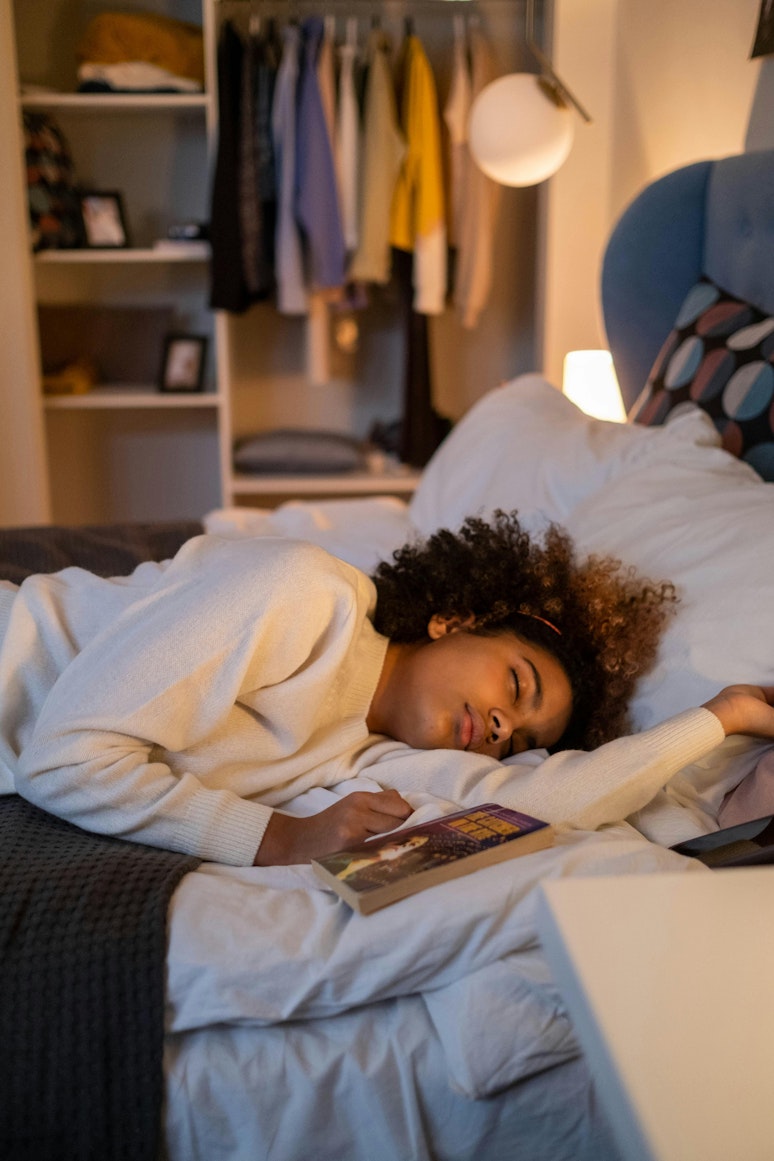How much sleep does your teen really need?
Understanding your teen’s sleep cycle

Updated December 2, 2025 • Medically reviewed by Dr. Emma Dickie
Medically reviewed by Dr. Emma DickieIn this article
Quick summary
- Teens’ late bedtimes aren’t always bad habits – their internal body clocks naturally shift during puberty
- They need 8-10 hours of sleep a night, but lots of teens get far less, which can affect mood, focus and health
- You can support them with getting better sleep with gentle changes like tech-free wind-down time, consistent bedtimes and tracking their sleep habits in luna

You might notice your teen is up late one night, groggy the next morning, and still scrolling long after bedtime.
We know that for a lot of parents, it can be frustrating, especially when you’re doing your best to help them stick to routines.
But the truth is, those ever-changing sleep patterns aren’t just “bad habits” – they’re a natural part of how your teen’s body is changing.
Sleep plays a vital role in your teen’s health, development, and emotional wellbeing.
So let’s take a closer look at why it’s so hard for teens to manage sleep and how much they need.
Why do teenagers sleep late?
Before we dive into how much sleep teens actually need, let’s start with the bigger question: why are they going to bed so late in the first place?
Is it screen time? Laziness? Just a refusal to switch off?
While those things might play a role, the real answer is more biological than behavioural.
During puberty, the body’s internal clock – known as the circadian rhythm – naturally shifts forward by 1-2 hours.
That means your teen’s brain doesn’t start winding down for sleep until much later in the evening, even if they’ve had a full-on day.
Now, on top of that, if we mix the pull of social media, homework, after-school activities, and a bit of good old-fashioned FOMO, it’s no surprise bedtime gets pushed back again and again.
The problem?
Their morning responsibilities don’t shift to match.
So while their body wants to sleep in, school alarms don’t wait, leading to sleep debt, brain fog, and a rollercoaster of mood changes.
Understanding that this shift is physiological (not just poor discipline) can go a long way in how we support our teens through it.
How much sleep do teenagers need?
According to the NHS and the Sleep Foundation, teenagers between the ages of 13 to 18 should aim for 8 to 10 hours of sleep per night.
However, studies show most teens get far less, with many averaging only 6 to 7 hours on school nights.
If your teen is…
- Falling asleep during the day or in class
- Struggling to concentrate or remember things
- More irritable or emotional than usual
- Oversleeping on weekends
…it may be a sign they’re not getting the sleep their body needs.
Try recommending that they track their sleep for at least a week using luna; it can help spot patterns and start conversations around healthier routines.

Do teenagers need more sleep than adults?
Yes, teens need more sleep than adults, and definitely more than they’re usually getting.
While adults typically function well on 7-8 hours, teenagers need closer to 8 to 10 hours of sleep each night to support:
- Brain development and memory
- Emotional regulation and mood stability
- Growth and hormone balance
- Academic performance and focus
- Immune health and energy levels
In short, sleep isn’t just about rest.
It’s an active process that helps their brain and body grow, and skipping it can lead to more than just grumpiness.
Tips to support better teen sleep
You don’t need a total routine overhaul to help your teen get more rest.
In fact, small, sustainable changes are often the most effective, especially when they’re led with empathy instead of pressure.
Here are some gentle, teen-friendly strategies that can encourage healthier sleep habits:
- Encourage a calming wind-down routine with screen-free time, reading, or a warm shower
- Stick to consistent sleep and wake times, even on weekends
- Set gentle tech boundaries, like a phone-free zone or charging devices outside the bedroom
- Expose them to natural morning light to help reset their internal clock
- Talk about the benefits of sleep rather than enforcing strict rules
When your teen gets the sleep they need, life feels smoother for everyone. Fewer arguments, clearer minds, and calmer mornings.
How we created this article:
luna's team of experts comprises GPs, Dermatologists, Safeguarding Leads and Junior Doctors as well as Medical Students with specialised interests in paediatric care, mental health and gynaecology. All articles are created by experts, and reviewed by a member of luna's senior review team.
Sources:
NHS "How much sleep do kids need" | Accessed 29.07.25
https://www.nhs.uk/live-well/sleep-and-tiredness/how-much-sleep-do-kids-need/Sleep Foundation "Teens and sleep" | Accessed 29.07.25
https://www.sleepfoundation.org/teens-and-sleepAmerican Academy of Sleep Medicine "Sleep guidelines for children and teens" | Accessed 29.07.25
https://aasm.org/clinical-resources/sleep-guidelines/UCLA Health "Sleep problems in teens" | Accessed 29.07.25
https://www.uclahealth.org/medical-services/sleep-disorders/patient-resources/patient-education/sleep-and-teensScienceDirect "The Teen Sleep study" | Accessed 29.07.25
https://www.sciencedirect.com/science/article/pii/S2590142719300114We'd love to keep in touch!
Sign up to our parent newsletter for emails on the latest teen trends, insights into our luna community and to keep up to date
By signing up, you are agreeing that we can use your email address to market to you. You can unsubscribe from marketing emails at any time by using the link in our emails. For more information, please review our privacy statement.